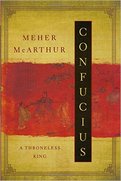
As many young people in my generation, I grew up generally familiar with the name of Confucius. The name is deeply woven into my association with China, and his influence there and in the world is undeniable. But when I came across this book – Confucius - A Throneless King – I realized how little I truly knew of his life, his place in history and his influence on Western philosophy, as well as Asian thought. This book provided a quick and very readable overview of the man's life and works, all placed in useful context.
Confucius lived in the six century B.C., during a time when China was riven by wars between feudal states. Though born in aristocratic origins, he was still considered a commoner, yet his reputation as a diligent young scholar helped him gain his first position in the civil service, as a manager of the grain warehouse for the Lu state. His conscientious work was rewarded with greater responsibility, managing the state’s heard of oxen and flocks of sheep. During this time his personal philosophy began to develop. And during this time he began to teach as well.
Yet the topic of his teachings was not yet social or political philosophy, which was still germinating within him. Instead, he taught what he had studied diligently for years: history, rituals, music and poetry. He described his credentials to teach: “He who by revising the old, knows the new, and is fit to be a teacher.” He advocated reading classic texts of the time such as The Book of Songs, which he felt had great wisdom. He once claimed the poems contained within this text could be summed up into a single phrase “Think no evil.” Herein the foundations of his later work were laid where he strived to develop a system of thought and ethics for social and political behavior that would promote peace and harmony.
His reputation within the state of Lu grew, and he attracted students from all across the capital city and the surrounding countryside as well. During this time three influential families, who were subservient to the duke of the state were struggling for dominant power. And as one family ascended, they reached out to Confucius to help validate their influence because of his righteous reputation. Political struggles continued between the families, while competing states outside Lu competed for dominance and power. Confucius was ultimately left disillusioned and resigned from his government post.
A began a long set of journeys visiting small kingdoms in northeast and central China, and at the courts of the states he visited he expounded his teachings. He never saw them implemented, however. At the age of 68 he was invited to return to the state of Lu. There he spent his final years teaching his disciples and writing his wisdom in a set of texts known as the Five Classics. In his life time, he never saw the impact or adoption of his teachings. It was through his disciples and his texts that he finally gained influence and incorporation into the Chinese way of life, and later in the world. He was a remarkable man whose knowledge and influence resonate with untarnished integrity even today.
Confucius lived in the six century B.C., during a time when China was riven by wars between feudal states. Though born in aristocratic origins, he was still considered a commoner, yet his reputation as a diligent young scholar helped him gain his first position in the civil service, as a manager of the grain warehouse for the Lu state. His conscientious work was rewarded with greater responsibility, managing the state’s heard of oxen and flocks of sheep. During this time his personal philosophy began to develop. And during this time he began to teach as well.
Yet the topic of his teachings was not yet social or political philosophy, which was still germinating within him. Instead, he taught what he had studied diligently for years: history, rituals, music and poetry. He described his credentials to teach: “He who by revising the old, knows the new, and is fit to be a teacher.” He advocated reading classic texts of the time such as The Book of Songs, which he felt had great wisdom. He once claimed the poems contained within this text could be summed up into a single phrase “Think no evil.” Herein the foundations of his later work were laid where he strived to develop a system of thought and ethics for social and political behavior that would promote peace and harmony.
His reputation within the state of Lu grew, and he attracted students from all across the capital city and the surrounding countryside as well. During this time three influential families, who were subservient to the duke of the state were struggling for dominant power. And as one family ascended, they reached out to Confucius to help validate their influence because of his righteous reputation. Political struggles continued between the families, while competing states outside Lu competed for dominance and power. Confucius was ultimately left disillusioned and resigned from his government post.
A began a long set of journeys visiting small kingdoms in northeast and central China, and at the courts of the states he visited he expounded his teachings. He never saw them implemented, however. At the age of 68 he was invited to return to the state of Lu. There he spent his final years teaching his disciples and writing his wisdom in a set of texts known as the Five Classics. In his life time, he never saw the impact or adoption of his teachings. It was through his disciples and his texts that he finally gained influence and incorporation into the Chinese way of life, and later in the world. He was a remarkable man whose knowledge and influence resonate with untarnished integrity even today.
 RSS Feed
RSS Feed
